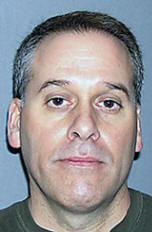Judge must decide whether to
block photos in trial of
Greenback engineers


Clark Allan Roberts, 46
and Sean Edward Howley, 38,
charged with conspiring to steal trade secrets from
Goodyear Tire & Rubber Co.
Men accused of trying to steal trade secrets from Goodyear Tire plant in Kansas
That argument did not sit well with U.S. Magistrate Judge Clifford Shirley Tuesday as he considered whether to grant federal prosecutors’ request to block the public from seeing evidence in the upcoming trial of two engineers accused of trying to steal trade secrets from Goodyear Tire & Rubber Co.
“What you’re telling me, it sounds to me, is ‘we’ll tell you what evidence contains trade secrets,’” Shirley said. “How do I know what exhibits come under that umbrella?”
The issue arose when Assistant U.S. Attorney Thomas Dougherty asked Shirley to bar the public display of seven photographs authorities allege Greenback engineers Clark Alan Roberts, 46, and Sean Edward Howley, 38, snapped of a device at Goodyear’s plant in Topeka, Kan., in May 2007.
The pair are accused in a federal indictment of tricking their way into the inner sanctum of Goodyear’s plant to secretly snap photos of a device used to make massive off-the-road tires the pair were trying to help their Wyko Tire Technology bosses in Greenback craft for a firm in China. The duo is charged under the Economic Espionage Act, which makes it a federal crime to steal trade secrets.
The Greenback engineers allegedly convinced Goodyear officials they wanted to tour the Kansas plant to take a look at Wyko equipment used by Goodyear that was in need of repair. Roberts, the indictment alleges, served as look-out while Howley used his phone to take shots of the device Goodyear used to make its OTR tires.
Dougherty insisted he and fellow prosecutor Greg Weddle did not need to convince Shirley the photographs actually contain trade secrets to get his approval to cloak the images in official secrecy.
“There’s no requirement that we prove they contain trade secrets,” he said.
But defense attorney Stephen Ross Johnson countered it was up to a jury to decide if the photographs show trade secrets. He and fellow defense attorneys Tom Dillard and Doug Trant contend they do not.
“(Without a hearing and proof) there’s no pretrial determination of what protected information there is except what (the government) says it is,” Johnson said. “That really is an unfair suggestion to the jury this is some kind of confidential material when that is the very issue the jury is to determine. We believe the government has the burden here to establish this material contains trade secrets … by clear and convincing evidence.”
It is now up to Shirley to decide if prosecutors must make a case to back up their claims of trade secrets before he decides whether to actually seal exhibits in the case. He’ll need to work fast. The pair are set to be tried in March.